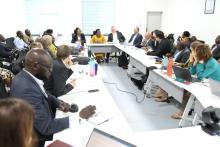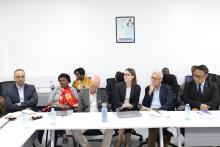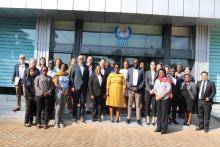Health Development Partners’ Retreat Strengthens Coordination for Better Health Outcomes in Uganda
The Health Development Partners (HDP) Retreat convened at the WHO Uganda Country Office today, bringing together partners in the health sector to discuss strategies for enhancing HDP strategic alignment and coordination, health sector priorities and critical gaps on financing within the health sector. This year’s retreat also underscored the need to improve coordination among health development partners, particularly in response to ongoing health challenges such as the Ebola virus disease outbreak.
Dr Diana Atwine, Permanent Secretary of the Ministry of Health, addressed the gathering, expressing appreciation for the partners' past and ongoing support for Uganda’s health sector. She also stressed the urgency of integration and a coordinated response to the Ebola disease virus outbreak. “The outbreak poses a significant threat not only to public health but also to our collective progress,” she warned.
In her remarks, Dr Kasonde Mwinga, the World Health Organization Country Representative, emphasized the critical role of the HDP in harmonizing efforts to support Uganda’s public health initiatives. “As members of this group, we bear a significant responsibility in supporting decision-making and implementing actions to improve the health and well-being of people living in Uganda,” she stated. Her remarks reinforced the collective commitment required to address pressing health challenges.
Dr Mike Ryan, WHO’s Executive Director for the Health Emergencies Programme and Deputy Director-General, commended the Ministry of Health for its swift and effective response efforts, particularly in vaccination, laboratory screening, and airport exit screening. “In times of crisis, coordination is not just beneficial; it is essential,” he stated. Dr Ryan reiterated that strong collaboration significantly enhances emergency response efforts and ultimately saves lives.
Discussions also focused on coordinating the efforts of health development partners to align with Uganda's national health priorities and enhance integrated service delivery.
To this end, Dr Sarah Byakika, Commissioner, Planning, Financing and Policy at the Ministry of Health provided an overview on health sector priorities within the national development plan (NDP IV). Dr Stavia Turyahabwe, Commissioner, Communicable Diseases, spoke to the critical gaps on financing within the health sector, including human resources, commodities and supplies, while highlighting the importance of integration.
UNFPA Deputy Representative in Uganda and HDP Chair, Daniel Alemu, reflected on the contributions of the HDP. “While our progress has strengthened coordination and resource optimization, challenges remain in financing and integration. We must reinforce collaboration, streamline structures, and commit to a unified plan with robust monitoring. The health sector’s resilience depends on collective action. Let’s work together to drive efficiency, equity, and impactful interventions.”
Counsellor of Health at the Embassy of Sweden and HDP Co-chair, Tomas Lundström, reiterated the importance of collaboration, while emphasizing the need for flexibility, adaptability and responsiveness.
WHO further called upon health development partners to:
Enhance transparency and mutual accountability: In particular towards information sharing and timely reporting of their technical and financial assistance to the government.
Advance the efficiency agenda: With shifting global health financing, improving efficiency has become increasingly crucial, and thus aligning interventions and eliminating redundancies to optimize resources.
Invest in primary health care: Bringing services closer to communities by scaling up community-led initiatives and securing sustainable funding is essential for long-term success.
Improve active engagement with other sectors: Strengthening collaboration with other sectors such as education and social development, while enhancing information sharing among respective development partners groups.
As discussions concluded, participants expressed a strong sense of urgency to translate commitments into measurable actions. The retreat served as a platform for reflection, forging new partnerships, and reinforcing existing collaborations.
Dr Mwinga reiterated WHO’s dedication to facilitating collaboration among partners. “To ensure lasting impact, we must go beyond dialogue and actively translate our commitments into measurable actions,” she stressed.
As Dr Ryan aptly stated, “In unity lies our strength.” The retreat reaffirmed that coordinated efforts can drive substantial progress toward achieving better health for all Ugandans, even amid ongoing challenges such as the Ebola virus outbreak.






